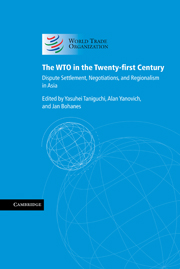Book contents
- Frontmatter
- Contents
- Notes on contributors
- Acknowledgements
- Table of dispute settlement cases and reports
- List of abbreviations
- Introduction
- PART I The WTO at Ten
- PART II Accomplishments and Future Prospects of the WTO Dispute Settlement System
- PART III Asian Perspectives on WTO Dispute Settlement
- 11 East Asia in the WTO dispute settlement mechanism
- 12 Japan's perspectives on the present Dispute Settlement Understanding negotiations
- 13 A review of some appellate decisions: law, policy, and economics in dispute settlement
- 14 Is the WTO dispute settlement mechanism important to business?
- 15 Japan's approach to the ‘use’ of the WTO: how can we achieve an effective link between business and the WTO?
- PART IV The Doha Development Agenda and Beyond
- PART V Asian Regional Integration and the Multilateral Trading System
- Index
14 - Is the WTO dispute settlement mechanism important to business?
from PART III - Asian Perspectives on WTO Dispute Settlement
Published online by Cambridge University Press: 05 March 2012
- Frontmatter
- Contents
- Notes on contributors
- Acknowledgements
- Table of dispute settlement cases and reports
- List of abbreviations
- Introduction
- PART I The WTO at Ten
- PART II Accomplishments and Future Prospects of the WTO Dispute Settlement System
- PART III Asian Perspectives on WTO Dispute Settlement
- 11 East Asia in the WTO dispute settlement mechanism
- 12 Japan's perspectives on the present Dispute Settlement Understanding negotiations
- 13 A review of some appellate decisions: law, policy, and economics in dispute settlement
- 14 Is the WTO dispute settlement mechanism important to business?
- 15 Japan's approach to the ‘use’ of the WTO: how can we achieve an effective link between business and the WTO?
- PART IV The Doha Development Agenda and Beyond
- PART V Asian Regional Integration and the Multilateral Trading System
- Index
Summary
I have been working at a Japanese steel company for over 20 years on various investment and trade matters, including a number of trade disputes that have been brought before the dispute settlement system of the World Trade Organization (WTO). In the following chapter, I offer a personal perspective on the subject: ‘Business and the WTO dispute settlement mechanism’.
My discussion addresses some basic questions.
Is the WTO dispute settlement mechanism important to business?
The first question is whether or not the WTO dispute settlement mechanism is important to business. Unquestionably, the answer is ‘Yes’. The dispute settlement mechanism is very important to business. Every decision of the WTO dispute settlement system affects business.
Japanese taxes on alcoholic beverages
To demonstrate the importance of the WTO dispute settlement mechanism, consider a WTO case: Japan – Alcoholic Beverages II. The Japanese government lost this case. The rulings in this case had a tremendous impact on the Japanese alcoholic beverage business. The dispute concerned the Japanese Liquor Tax Law and shochu. Shochu is a traditional colourless distilled liquor (‘white liquor’). The European Communities, together with the United States and Canada, claimed that: (i) shochu was directly competitive with whisky, brandy, and other ‘brown’ spirits; and (ii) shochu and these ‘brown’ spirits were substitutable products, but (iii) that higher tax rates were applied to ‘brown’ spirits, in violation of Article III (National Treatment) of the General Agreement on Tariffs and Trade (GATT) 1994.
- Type
- Chapter
- Information
- The WTO in the Twenty-first CenturyDispute Settlement, Negotiations, and Regionalism in Asia, pp. 294 - 302Publisher: Cambridge University PressPrint publication year: 2007



